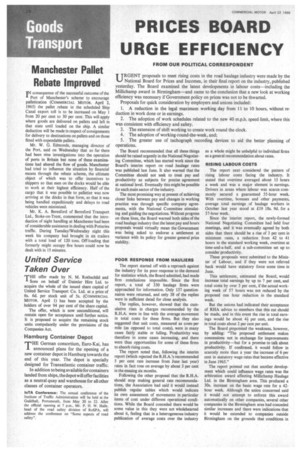PRICES BOARD URGE EFFICIENCY
Page 30

If you've noticed an error in this article please click here to report it so we can fix it.
FROM OUR POLITICAL CORRESPONDENT
URGENT proposals to meet rising costs in the road haulage industry were made by the National Board for Prices and Incomes, in their final report on the industry, published yesterday. The Board examined the latest developments in labour costs—including the Millichamp award in Birmingham—and came to the conclusion that a new look at working efficiency was necessary if Government policy on prices was not to be thwarted.
Proposals for quick consideration by employers and unions included:
1. A reduction in the legal maximum working day from 11 to 10 hours, without reduction in work done or in earnings.
2. The adoption of work schedules related to the new 40 m.p.h. speed limit, where this was consistent with efficiency and safety.
3. The extension of shift working to create work round the clock.
4. The adoption of working-round-the-week, and; 5. The greater use of tachograph recording devices to aid the better planning of operations.
The Board recommended that all these things should be raised urgently in the National Negotiating Committee, which has started work since the Board's interim report on road haulage rates was published last June. It also warned that the Committee should not seek to treat pay and productivity as subjects for precise agreement at national level. Eventually this might be possible for each main sector of the industry.
The most promising way at present of achieving closer links between pay and changes in working practice was through specific company agreements, with the National Committee stimulating and guiding the negotiations. Without progress on these lines, the Board warned both sides of the road haulage industry that the latest pay and hours proposals would virtually mean the Government was being asked to endorse a settlement at variance with its policy for greater general price stability.
POOR RESPONSE FROM HAULIERS The report started off with a reproach against the industry for its poor response to the demand for statistics which, the Board admitted, had made firm conclusions impossible. Since the first report, a total of 330 haulage firms were approached for information. Only 137 questionnaires were returned, and only 38 of the replies were in sufficient detail for close analysis.
The replies, however, showed that the cumulative rises in charges recommended by the R.H.A. were in line with the average movement in total costs for these firms. But they also suggested that unit costs, measured as costs per mile (as opposed to total costs), were in many cases fairly stable or falling. Productivity was therefore in some cases increasing, and there were thus opportunities for some of these firms to absorb rising costs.
The report noted that, following the interim report (which rejected the K.HA.'s recommended 5 per cent rate increase from June last year) rates in fact rose on average by about 3 per cent in the ensuing six months.
Following the other proposal that the R.H.A. should stop making general rate recommendations, the Association had said it would instead publish regular tables which would indicate its own assessment of movements in particular items of cost under different operational conditions. While the Board conceded there would be some value in this they were not wholehearted about it, feeling that in a heterogeneous industry publication of average costs over the industry as a whole might be unhelpful to individual firms as a general recommendation about rates.
RISING LABOUR COSTS The report next considered the pattern of rising labour costs facing the industry‘ It stated that overtime averaged about 15 hours a week and was a major element in earnings. Drivers in areas where labour was scarce commonly secured a guaranteed 55-hour week. With overtime, bonuses and other payments, average total earnings of haulage workers in October last year stood at 19 18s. 9d. for a 57-hour week.
Since the interim report, the newly-formed National Negotiating Committee had held four meetings, and it was eventually agreed by both sides that there should be a rise of 3 per cent in minimum rates, a reduction from 42 to 41 hours in the standard working week, overtime at time-and-a-half, and a sub-committee set up to, consider productivity.
These proposals were submitted to the Minister of Labour, and if they were not referred back would have statutory force some time in June.
This settlement, estimated the Board, would increase total earnings by up to 7 per cent, and total costs by over 3 per cent, if the actual working week of 57 hours was not reduced by the proposed one hour reduction in the standard week.
But the unions had indicated their acceptance of RHA advice to members that this cut should be made, and in this event the rise in total earnings would be about 4-f per cent, and the rise in total costs about 2 per cent per unit.
The Board pinpointed the weakness, however, by adding: "The proposed settlement makes concessions not in exchange for improvements in productivity—but for a promise to talk about productivity. If confirmed, it would follow in scarcely more than a year the increase of 6 per cent in statutory wage rates that became effective in June 1965."
The report pointed out that another development which could influence wage rates was the arbitration award affecting Millichamp Haulage Ltd. in the Birmingham area. This produced a 30s. increase on the basic wage rate for a 42hour week. Although the union concerned said it would not attempt to enforce this award automatically on other companies, several other companies in the Birmingham area had conceded similar increases and there were indications that it would be extended to companies outside Birmingham on the grounds that conditions in




























































































































